




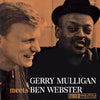
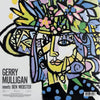
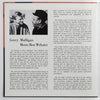
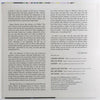
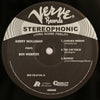
Gerry Mulligan meets Ben Webster
Baritone Saxophone – Gerry Mulligan [click here to see more vinyl featuring Gerry Mulligan]
Tenor Saxophone – Ben Webster [click here to see more vinyl featuring Ben Webster]
Bass – Leroy Vinnegar
Drums – Mel Lewis
Piano – Jimmy Rowles
Written by Gerry Mulligan (A2, B1-3), Ben Webster (A2), Billy Strayhorn (A1), Chester Conn (A3), Bennie Krueger (A3), Nathan "Ned" Miller (A3), Jule Styne (A3)
1 LP, gatefold jacket printed by Stoughton Printing
Original analog Master tape : YES
Heavy Press : 180g
Record color : black
Speed : 33 RPM
Size : 12'’
Stereo
Studio
Record Press : Quality Record Pressings
Label : Verve Acoustic Sounds Series
Original Label : Verve
Recorded November 3 & Dec. 2, 1959 at Radio Recorders, L.A.
Original Session produced by Norman Granz
Remastered by Ryan K. Smith at Sterling Sound
Reissue produced by Chad Kassem
Liner Notes by Nat Hentoff
Originally released in 1960
Reissued in July 2024
Tracks:
Side A:
- Chelsea Bridge
- The Cat Walk
- Sunday
Side B:
- Who's Got Rhythm
- Tell Me When
- Go Home
Awards:
Number 448 in Colin Larkin's All Time Top 1000 Albums
Reviews :
“Make no mistake about it, the swing and bop start right here on this legendary 1959 session between baritone saxophonist Gerry Mulligan and tenor man Ben Webster. Produced by Norman Granz as an early Verve album, this Mobile Fidelity 24-karat gold-disc reissue is sonically worth the extra bread as it feels like you're right in the control room every note of the way. The opening track, Billy Strayhorn's "Chelsea Bridge" is lush and emotional and truly sets the tone for this album. With Jimmy Rowles on piano (his intro on "Sunday" sounds like a ragtimer like Willie "The Lion" Smith just pushed him off the stool before the band came in), Mel Lewis on drums, and the always superb Leroy Vinnegar on bass present and accounted for, the rhythm section is superbly swinging with just the right amount of bop lines and chords in the mix to spice things up. The ghost of Duke Ellington hovers over every note on this record (Billy Strayhorn was one of his main arrangers) and that is a very good thing, indeed. There's a beautiful, understated quality to the music on this session that makes it the perfect relaxing around the house on a rainy day disc to pop in the player. File this one under cool, very smooth, and supple.” AllMusic Review by Cub Koda
Half-speed mastering. In half-speed mastering, the whole process is slowed down to half of the original speed. A typical 33 1/3 rpm record is cut at 16 2/3 rpm. The source material is also slowed down (reducing the pitch in the process) meaning the final record will still sound normal when played back. Slowing the whole process down allows more time, which means the end result sounds better and is more efficient — allowing engineering to minimize the effects of inherent limitations within the vinyl format. The result is a more accurate and more open high-frequency response in the half speed vinyl when compared with a normal speed recording.
Ratings :
AllMusic : 5 / 5 , Discogs : 4,61 / 5




